This month, members of the Ontario Medical Association begin voting for the next president of the Canadian Medical Association.
Ahead of the election, which runs from Feb. 15 through March 7, Healthy Debate put four questions to each of the candidates. This week, from Monday through Thursday, we present each of their answers to one of the questions. We’re calling this series “Four for four,” and we believe it offers a unique opportunity to get to know the candidates and gain an understanding of the next president of the CMA.
The four candidates are: palliative care physician Dr. Sandy Buchman; psychiatrist Dr. Mamta Gautam; emergency physician Dr. Atul Kapur; and family physician Dr. Darren Larsen. Below, they answer the first of the four questions Healthy Debate asked.
Read their answers to the second question (on physician burnout), the third (on the move to more patient-centred health care) and the fourth, (on proposed tax changes by the federal government).
Parents who don’t want to have their children immunized are…
…unwittingly contributing to increasing the risk of the entire population to preventable diseases. They believe that they are acting in their child’s best interest but sadly their thinking is misguided. We must seek to understand the context behind their rationale.
There has been growing tension between those who value scientific research and the long-standing role of physicians vs. those who prefer popular opinion and non-allopathic providers. Traditional medical care is seen as outmoded, and non-experts, particularly popular celebrities, reject evidence-based treatments.
The anti-vaccine populist movement has triggered public debate about the relative value of scientific research vs. popular belief and personal opinion. Each group wishes to influence public health policy. Despite mandatory immunization legislation, courts have often decided in favour of those parents refusing vaccination for their children given the value of personal autonomy with regard to health care decisions that is valued by our society. This is not an effective strategy to improve immunization rates.
One of the most effective ways to persuade parents who are skeptical or fearful of vaccinating their children is by truly listening to their concerns, being nonjudgmental, acknowledging that they are making an important health care decision out of love for their child and belief they are acting in the child’s best interest. This kind of acknowledgment and respect enhances trust in the physician and his/her opinions. I have often tried to help parents to understand that when they choose not to vaccinate they are making a decision for other people’s children as well. This new awareness of the broader implications of their decision can have a significant influence to choose to vaccinate.
As with most things for human beings, it’s about relationships. A trusting mutually respectful relationship between physician and patient/parent is an effective way to ensure immunization for the great majority of children.
Dr. Sandy Buchman is a palliative care physician providing home-based palliative care through Mount Sinai Hospital and palliative care for the homeless through St. Michael’s Hospital in Toronto.
Parents who don’t want to have their children immunized are…
…“selfish,” according to Immunize Texas, a pro-vaccine grassroots community group. These parents are definitely making a choice that puts others at risk. To achieve herd immunity, the CDC states that 80-95 percent of the population needs to get a given vaccine. Even a small number of unvaccinated people can make it much easier for a disease to spread and survive.
In Policy Insights from the Behavioral and Brain Sciences, researchers break down the psychology of four different types of non-vaccinators, in the hopes of finding effective strategies to change their minds.
- The Complacent don’t really see the diseases as a threat, and passively omit vaccination, not actively decide against it. “Nobody gets measles anymore.”
- The Inaccessible have barriers to obtain the vaccine, such as shortage of health-care resources, distance from health care, lack of insurance, or a language barrier.
- The Calculating engage in an extensive information search for pros and cons of vaccination, know about herd immunity but feel ambivalent about it, and decide to omit vaccination as long as enough other individuals are vaccinated to keep the infection risk low.
- The Unconfident, the classic anti-vaxxers, feel negative about vaccines, want individual liberty and purity, and don’t trust the vaccines, the doctors or the policymakers.
I believe that interventions should be targeted to these differences: motivating the complacent, removing barriers for those for whom vaccination is inaccessible, adding incentives and additional utility for the calculating, and highlighting the positive reasons to get vaccinated for the unconfident. We need to counter this situation with non-judgmental and non-confrontational education to dispel myths and explain outcomes, relation-based interventions, and support primary care providers who deal with parents. And perhaps monitor the impact of laws elsewhere for mandatory vaccination or reporting parents who don’t vaccinate.
Dr. Mamta Gautam is an Ottawa-based psychiatrist, and an expert in physician health and physician leadership.
Parents who don’t want to have their children immunized are…
They are concerned and care for the health of their family. They are neither irresponsible nor stupid; in fact, they have done much research into this. However in today’s world of pseudo-news, we have to grapple with pseudo-science and the fact that our patients receive information from a variety of sources, not all of which are accurate. Our public health and epidemiology colleagues both tell us that vaccination is the single-most important thing we can do to improve population health. Knowing that, we need to find ways to translate the best available evidence into messages that our patients can understand and find credible, starting from our common interest, the health of their children, and proceeding in a respectful discussion. While this may be difficult for many of us, it has been shown to be the most effective way to achieve the best outcome for our young patients.
The CMA can help in a couple of ways. We can distribute tools that can help guide the discussions with parents in the office. I would also work with the Association to expand the efforts to counter misinformation in the media, so that the myths that parents are hearing do not go unchallenged. (If we could get a celebrity spokesperson, that probably wouldn’t hurt either.)
Dr. Atul Kapur is an emergency physician in Ottawa, political advocate and proponent for a smoke-free Canada.
Parents who don’t want to have their children immunized are…
…as deserving of our care as anyone else. Of course, we ought to emphasize the personal and public benefits of vaccines. Several patients in my practice initially opted against vaccinations. Usually, this was due to fear from inaccurate stories shared online and in popular press. Over time, I earned their trust. As the family’s main physician, I was able to have authentic conversations that addressed their fears. I was able to understand their concerns, and give them my best advice. They usually ended up following it. Their children got the vaccinations they needed to stay healthy before entering school. Each time, I did not approach the topic through condescension or coercion. I valued the love they had for their children, and I was a partner in their child’s care. It took time. The work paid off in a meaningful, robust, and enduring doctor-patient relationship.
Dr. Darren Larsen is a family physician with Women’s College Hospital Family Practice Health Centre and Chief Medical Information Officer for OntarioMD.






The comments section is closed.
These doctors are brainwashed, no vaccine safety test has ever been done since 1986.